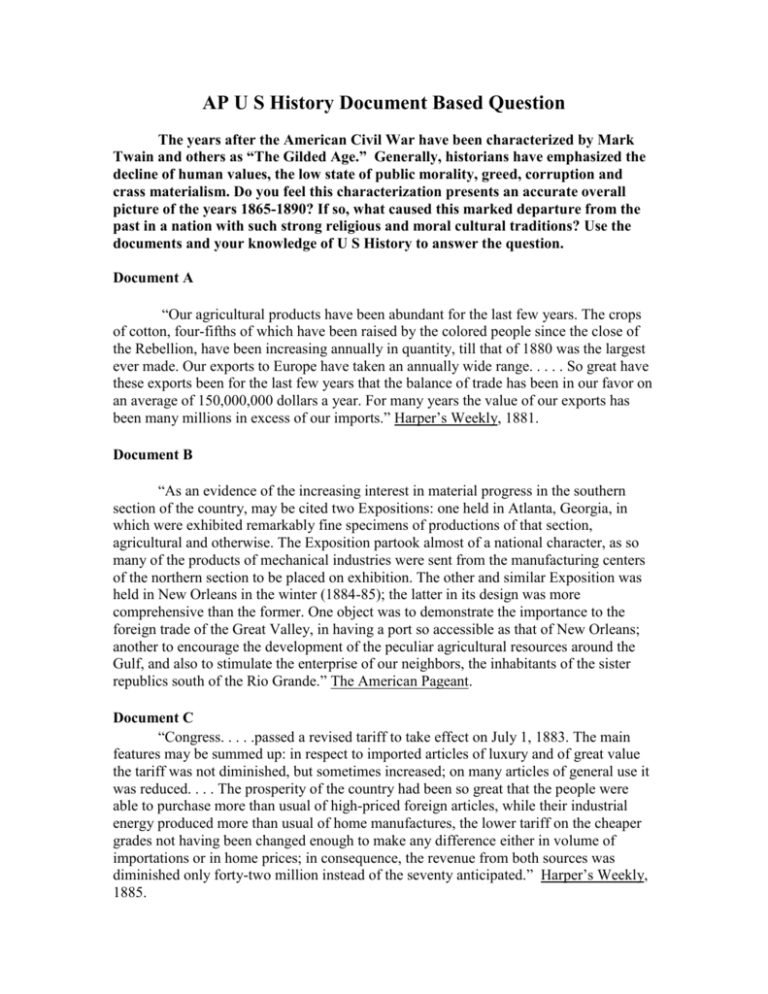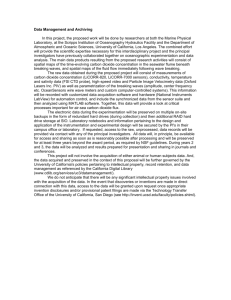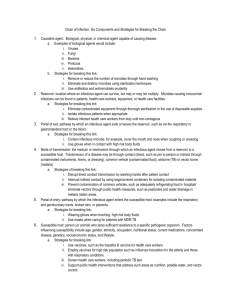6.0 Gilded Age 1.doc
advertisement

AP U S History Document Based Question The years after the American Civil War have been characterized by Mark Twain and others as “The Gilded Age.” Generally, historians have emphasized the decline of human values, the low state of public morality, greed, corruption and crass materialism. Do you feel this characterization presents an accurate overall picture of the years 1865-1890? If so, what caused this marked departure from the past in a nation with such strong religious and moral cultural traditions? Use the documents and your knowledge of U S History to answer the question. Document A “Our agricultural products have been abundant for the last few years. The crops of cotton, four-fifths of which have been raised by the colored people since the close of the Rebellion, have been increasing annually in quantity, till that of 1880 was the largest ever made. Our exports to Europe have taken an annually wide range. . . . . So great have these exports been for the last few years that the balance of trade has been in our favor on an average of 150,000,000 dollars a year. For many years the value of our exports has been many millions in excess of our imports.” Harper’s Weekly, 1881. Document B “As an evidence of the increasing interest in material progress in the southern section of the country, may be cited two Expositions: one held in Atlanta, Georgia, in which were exhibited remarkably fine specimens of productions of that section, agricultural and otherwise. The Exposition partook almost of a national character, as so many of the products of mechanical industries were sent from the manufacturing centers of the northern section to be placed on exhibition. The other and similar Exposition was held in New Orleans in the winter (1884-85); the latter in its design was more comprehensive than the former. One object was to demonstrate the importance to the foreign trade of the Great Valley, in having a port so accessible as that of New Orleans; another to encourage the development of the peculiar agricultural resources around the Gulf, and also to stimulate the enterprise of our neighbors, the inhabitants of the sister republics south of the Rio Grande.” The American Pageant. Document C “Congress. . . . .passed a revised tariff to take effect on July 1, 1883. The main features may be summed up: in respect to imported articles of luxury and of great value the tariff was not diminished, but sometimes increased; on many articles of general use it was reduced. . . . The prosperity of the country had been so great that the people were able to purchase more than usual of high-priced foreign articles, while their industrial energy produced more than usual of home manufactures, the lower tariff on the cheaper grades not having been changed enough to make any difference either in volume of importations or in home prices; in consequence, the revenue from both sources was diminished only forty-two million instead of the seventy anticipated.” Harper’s Weekly, 1885. Document D ". . . . . A due regard for the interests and prosperity of all the people demands that . . . our system of revenue shall be so adjusted as to relieve she people of unnecessary taxation, . . . . .and preventing the accumulation of a surplus in the Treasury to tempt extravagance and waste. . . . The people demand reform in the administration of the Government, and the application of business principles to public affairs. As a means to this end Civil Service reform should be in good faith enforced. . . . In the administration of a government pledged to do equal and exact justice to all men, there should be no pretext for anxiety touching the protection of the freedmen in their rights or their security in the enjoyment of their privileges under the Constitution and its Amendments. . . . The fact that they are citizens entitles them to all the rights due to that relation, and charges them with all its duties, obligations and responsibilities." President Grover Cleveland in his Inaugural Address [that of the first Democratic President since 1860] 1885. Document E President Chester Arthur issued these rules [1881]: "First: No person in civil service shall use his office, his official authority or influence, either to coerce the political action of any person or body to interfere with any election. Second: No person in the public service shall for that reason be under any obligation to contribute to any political fund or render any political service, and he will not be removed or otherwise prejudiced for refusing to do so." Document F “. . . . .Many of the calamitous efforts of the tremendous revolution which has passed over the southern States still remain. The immeasurable benefits which will surely follow, sooner or later, the hearty and generous acceptance of the legitimate results of that revolution have not yet been realized. . . . . The people of those States are still impoverished, and the inestimable blessing of wise, honest, and peaceful local selfgovernment is not fully enjoyed. But it must not be forgotten that only a local government which recognizes and maintains inviolate the rights of all is a true selfgovernment. . . . .With respect to the two distinct races whose peculiar relations to each other have brought upon us the deplorable complications and perplexities which exist in those States, it must be a government which guards the interests of both races carefully and equally. . . . .” Rutherford B. Hayes, Inaugural Address, March 5, 1877. Document G “Under this Constitution the boundaries of freedom have been enlarged, the foundations of order and peace have been strengthened, and the growth of our people in all the better elements of national life has indicated the wisdom of the founders and given new hope to their descendants. . . . . The prosperity which now prevails is without parallel in our history. Fruitful seasons have done much to secure it, but they have not done all. The preservation of the public credit and the resumption of specie payments, so successfully attained by the Administration of my predecessors, have enabled our people to secure the blessings which the seasons brought.” James A. Garfield, Inaugural Address, March 4, 1881. Document H “It is very gratifying to observe the general interest now being manifested in the reform of our election laws. Those who have been for years calling attention to the pressing necessity of throwing about the ballot box and about the elector further safeguards, in order that our elections might not only be free and pure, but might clearly appear to be so, will welcome the accession of any who did not so soon discover the need of reform. The National Congress has not as yet taken control of elections in that case over which the Constitution gives it jurisdiction, but has accepted and adopted the election laws of the several States, provided penalties for their violation and a method of supervision. . . . . Our pension laws should give more adequate and discriminating relief to the Union soldiers and sailors and to their widows and orphans. Such occasions as this should remind us that we owe everything to their valor and sacrifice.” Benjamin Harrison, Inaugural Address, March 4, 1889. Document I “At length it was brought to the surface. All who were allowed to approach crowded forward to see it. It was only when the cable was brought over the bow and on to the deck that men dared to breathe. Even then they hardly believed their eyes. Some crept toward it to feel of it, to be sure it was there. Then we carried it along to the electricians' room, to see if our long-sought-for treasure was alive or dead. Yet in the very height and fury of the gale, as I sat in the electricians' room, a flash of light came up from the deep, which, having crossed to Ireland, came back to me in mid-ocean, telling that those so dear to me, whom I had left on the bank of the Hudson, were well and following us with their wishes and their prayers. This was like a whisper of God from the sea, bidding me keep heart and hope. The Great Eastern bore herself proudly through the storm, as if she knew that the vital cord, which was to join two hemispheres, hung at her stern; and so, on Saturday, September 7th, we brought our second cable safely to the shore.” Cyrus W. Field, First Successful Atlantic Cable, Pg.30 Document J "The multitudinous officials of the city were the Tweed Ring's slaves. At one time eight hundred policemen stood guard to prevent a hostile majority in Tammany Hall itself from meeting. The thugs of the city, nicknamed "Tweed's lambs," rendered invaluable services at caucus and convention. Two days before election these venal cohorts would assemble in the 340 election districts, each man of them being listed and registered under several assumed names and addresses. From Tweed's house in 1868 six registered, from Justice Shandley's nine, from the Coroner's thirteen. A State Senator's house was put down as the home of thirty voters. One Alderman's residence nominally housed twenty, another's twenty-five, an Assemblyman's fifteen. And so it went. Bales of fictitious naturalization papers were secured. One year 105,000 blank applications and 69,000 certificates were ordered printed. The new citizens "put in" election day following their leaders from polling-place to polling-place as needed. . . .” Document K “The panic of 1873, so far as it resulted from contraction, had its main origin abroad, not in America, so that its subordinate causes were generally looked upon as its sole occasion; yet these bye causes were important. The shocking destruction of wealth by fires and by reckless speculation, of course, had a baneful effect. During 1872 the balance of trade was strongly against the United States. The circulation of depreciated paper money had brought to many an apparent prosperity which was not real, leading to the free creation of debts by individuals, corporations, towns, cities and States. An unprecedented mileage of railways had been constructed. Thus the entire business of the country was on a basis of inflation, and when contraction came disaster was inevitable. . . . . In September panic came, with suspension of several large banking houses in New York. Jay Cooke & CO., who had invested heavily in the construction of the Northern Pacific Railway, suspended on September 18th.” E. Benjamin Andrews, Panic Of 1873, Pg.160. Document L “I am to speak to you of the birth and babyhood of the telephone, and something of the events which preceded that important occasion. . . . . I realize now what a lucky boy I was, when at 13 years of age I had to leave school and go to work for my living, although I didn't think so at that time. . . . . for after trying several vocations -- clerking, bookkeeping, carpentering, etc. -- and finding them all unattractive, I had at last found just the job that suited me in the electrical workshop of Charles Williams. Better luck couldn't befall a boy than to be brought so early in life under the influence of such a highminded gentleman as Charles Williams. . . . .This was the year of the Centennial Exposition at Philadelphia, and Bell decided to make an exhibit there, and one of the jobs I did for Bell was to construct a telephone of each form that had been devised up to that time. . . . .” Thomas A. Watson, Coming Of The Telephone, Pg.207. Document M “This, then, is held to be the duty of the man of wealth: first, to set an example of modest, unostentatious living, shunning display or extravagance; to provide moderately for the legitimate wants of those dependent upon him; and after doing so to consider all surplus revenues which come to him simply as trust funds, which he is called upon to administer, and strictly bound as a matter of duty to administer in the manner which, in his judgment, is best calculated to produce the most beneficial results for the community-the man of wealth thus becoming the mere agent and trustee for his poorer brethren, bringing to their service his superior wisdom, experience, and ability to administer, doing for them better than they would or could do for themselves. . . .” Andrew Carnegie, Gospel of Wealth. Document N “The storm centers of labor agitation were in St. Louis and Chicago. In St. Louis a demand was made by the employees of the Texas Pacific Railway for the reinstatement of a foreman who had been discharged. The receiver refused the demand, and a strike took place which very soon extended to the Missouri Pacific, and, in fact, to all the roads constituting the Gould system. Traffic throughout the whole Southwest was practically suspended, and before long the strike took on the form of riot and incendiarism. United States troops were sent to maintain order, but their numbers were insufficient, and the rioters cared nothing for the special deputies who had been sworn in to keep the peace. A squad of these deputies fired upon a crowd, killing or wounding a number of persons (April 7th). This act inflamed the mob, which armed itself, and for a time was master of the city. The torch was applied to railroad property, factories were closed, and great losses were inflicted, not only upon the railways, but upon the entire population. . . . . Nearly fifty policemen were thrown to the ground, and seven of them were so badly wounded that they died soon after. Of the anarchists arrested for this outrage, seven were sentenced to death by Judge Gary. Of these seven, four had their sentences commuted to imprisonment for life. Harry Thurston Peck, Chicago Haymarket Riot, Pg.276. Document O “We meet in the midst of a nation brought to the verge of moral, political and material ruin. Corruption dominates the ballot box, the Legislatures, the Congress, and touches even the ermine of the bench. The people are demoralized; most of the States have been compelled to isolate the voters at the polling places to prevent universal intimidation or bribery. The newspapers are largely subsidized or muzzled, public opinion silenced, business prostrated, our homes covered with mortgages, labor impoverished, and the land concentrating in the hands of the capitalists. The urban workmen are denied the right of organization for self-protection; imported pauperized labor beats down their wages; a hireling standing army, unrecognized by our laws, is established to shoot them down, and they are rapidly degenerating into European conditions.. . . . From the same prolific womb of governmental injustice we breed the two great classes, tramps and millionaires. . . . .” The People's Party Platform, 1892. Document P “We are breaking up old traditions. We are breaking up hereditary rights, and planting everywhere the seed of universal rights. We are breaking up the idea that money makes the man and not moral worth. We are breaking up the idea that might makes right. We are breaking up the idea that legislation is alone for the rich. We are breaking up the idea that the Congress of the United States must be run by millionaires for the benefit of millionaires. We are breaking up the idea that a few men may hold millions of acres of untilled land while other men starve for the want of one acre. We are breaking up the practice of importing [European] ignorance, bred of monarchies and dynamite, in order to depreciate intelligent, skilled labor at home. We are breaking up the practice of employing little children in factories, thus breeding a race of deformed, ignorant, and profligate. We are breaking up the idea that a man who works with his hands has need neither of education nor of civilized refinements. We are breaking up the idea that the accident of sex puts one-half of the human race beyond the pale of constitutional rights. We are breaking up the practice of paying woman one-third the wages paid man simply because she is a woman. We are breaking up ignorance and intemperance, crime and oppression, of whatever character and wherever found. Journal of United Labor, July 16, 1887: 318. Document P The Gospel according to Carnegie Document Q Immigration to the United States Bureau of Census 1865 1866 1867 1868 1869 1870 1871 1872 1873 1874 1875 1876 1877 1878 1879 1880 1881 248,120 318,568 315,722 138,640 352,768 387,203 321,500 404,806 459,803 313,339 227,498 169,966 141,857 138,469 177,826 457,257 669,431 1882 1883 1884 1885 1886 1887 1888 1889 1890 1891 1892 1893 1894 1895 1896 1897 1898 788,992 603,322 518,592 395,346 334,203 490,109 546,889 444,427 455,302 560,319 579,663 439,730 285,631 258,536 343,267 230,832 229,299









